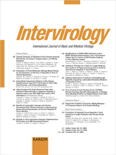
INTERVIROLOGY
Scope & Guideline
Uncovering breakthroughs in virology and infectious diseases.
Introduction
Aims and Scopes
- Viral Pathogenesis and Immunology:
The journal explores the mechanisms by which viruses cause disease, including host-pathogen interactions and immune responses. This includes studies on specific viruses like HIV, Hepatitis, and SARS-CoV-2. - Clinical Virology and Epidemiology:
INTERVIROLOGY publishes research on the clinical aspects of viral infections, including epidemiological studies, clinical outcomes, and the effectiveness of vaccines and treatments. - Innovative Diagnostic and Therapeutic Approaches:
The journal emphasizes the development of new diagnostic methods and therapeutic strategies for viral infections, including molecular techniques and novel antiviral agents. - Viral Genomics and Molecular Biology:
Research on the genetic characterization of viruses and their evolutionary patterns is a core focus area, contributing to the understanding of viral diversity and adaptation. - Public Health and Global Virology:
The journal addresses the global impact of viral diseases, focusing on public health challenges, surveillance, and strategies for controlling outbreaks.
Trending and Emerging
- COVID-19 Research:
A significant increase in studies focusing on SARS-CoV-2, including vaccine efficacy, clinical outcomes, and long-term effects, reflects the ongoing global pandemic and its implications for public health. - MicroRNA and Viral Interactions:
Research exploring the role of microRNAs in regulating viral infections and host responses is gaining traction, indicating a growing interest in post-transcriptional regulation in virology. - HIV and Co-Infections:
There is a notable rise in studies addressing HIV, particularly in relation to co-infections with Hepatitis viruses, highlighting the complexities of managing multiple viral infections. - Viral Genotyping and Variants:
The emergence of viral variants, particularly in the context of COVID-19 and other viral diseases, has led to increased research on genotyping and understanding viral evolution. - Antiviral Therapeutics and Vaccines:
An emphasis on developing new antiviral therapies and vaccines, particularly mRNA technology, is a prominent theme, reflecting the urgent need for effective treatments against viral infections.
Declining or Waning
- Veterinary Virology:
Research related to veterinary viruses, although still relevant, has seen a decrease in publication frequency as the journal shifts more towards human health and viral infections. - Basic Virology Studies:
Basic laboratory studies focused on viral biology without direct clinical implications are becoming less common, as there is a growing preference for research with immediate clinical relevance. - Historical Epidemiological Studies:
While historical perspectives on viral diseases were once more prevalent, the journal is increasingly prioritizing contemporary studies and current viral threats. - Non-Human Viral Infections:
Research on non-human viral infections, such as those in wildlife or agricultural settings, is less frequently featured, indicating a shift towards human-centric virology.
Similar Journals

Viruses-Basel
Elevating Knowledge in Virology and Public HealthViruses-Basel, published by MDPI, is a leading interdisciplinary journal focused on the field of virology and infectious diseases, offering a platform for the rapid dissemination of high-quality research. Established in 2009, this open access journal has become an essential resource for researchers and health professionals, ensuring that critical findings are readily available to a global audience. With an impressive Q1 ranking in Infectious Diseases and a Q2 ranking in Virology as of 2023, the journal reflects its commitment to impactful research, validated by its notable positions within Scopus categories—ranked #84 out of 344 in Medicine: Infectious Diseases and #27 out of 80 in Immunology and Microbiology: Virology. The journal adheres to high standards of academic rigor, and by embracing an open access model, it promotes unrestricted access to scientific knowledge, fostering collaboration among researchers, professionals, and students alike. Situated in Basel, Switzerland, the journal serves as a cornerstone in the dissemination of research findings related to viral diseases and their implications on public health.

Tumour Virus Research
Connecting the dots between infection and cancer.Tumour Virus Research, an esteemed journal published by Elsevier, serves as a vital resource in the fields of cancer research, infectious diseases, and virology. With an impact factor reflective of its influence and recognized as a Q2 journal in multiple categories as of 2023, it rigorously presents high-impact research dedicated to the understanding of viral pathogens in tumorigenesis. Since its transition to an Open Access model in 2021, the journal has enhanced accessibility, empowering researchers and the academic community globally to explore cutting-edge findings. The journal covers a broad scope, encompassing the intricate interactions between viruses and cancer biology, which is crucial for developing novel therapeutic strategies. With a commitment to advancing scientific knowledge, Tumour Virus Research welcomes submissions that push the boundaries of current understanding and contribute to the ongoing battle against virus-mediated cancers, making it an indispensable publication for professionals, researchers, and students in the field.

ANTIVIRAL RESEARCH
Pioneering Insights in Viral TherapeuticsANTIVIRAL RESEARCH, published by Elsevier, stands at the forefront of the study of antiviral agents and therapy, with a dedicated focus on advancing the understanding of viral infections and their mechanisms. The journal is recognized within the top tier of academic publications, belonging to the prestigious Q1 category in both Pharmacology and Virology as of 2023, ranking 12th out of 313 in Pharmacology and 11th out of 80 in Virology according to Scopus metrics, reflecting its significant impact in the field. With a long-standing history since its inception in 1959, it continues to serve as an essential platform for researchers and health professionals alike, sharing critical findings that drive innovation in antiviral therapeutics. Although it does not currently offer open access options, the journal’s rigorous peer-review process ensures that every published article meets high academic standards, providing invaluable insights for those dedicated to enhancing public health through virology research.
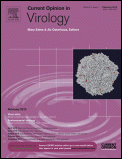
Current Opinion in Virology
Connecting Research with Clinical Innovation in VirologyCurrent Opinion in Virology, published by Elsevier Science Ltd, is a premier journal dedicated to advancing knowledge in the dynamic field of virology. Established as a respected source of comprehensive reviews and critical evaluations, this journal boasts an impressive impact factor and has achieved a distinguished Q1 category ranking for virology, signifying its pivotal role in the academic community. Serving researchers, professionals, and students alike, Current Opinion in Virology presents insightful contributions that delve into the latest developments, emerging trends, and pivotal challenges facing virology today. With its Scopus ranking placing it in the top 15% of its field, the journal provides unparalleled access to cutting-edge research that informs both basic and applied aspects of virology. Although not an open-access journal, it offers options for subscriptions that ensure accessibility to critical content. As the field continuously evolves, Current Opinion in Virology remains at the forefront, bridging the gap between research and clinical application, making it an essential resource for all in the virology community.
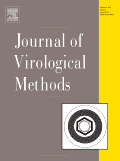
JOURNAL OF VIROLOGICAL METHODS
Enhancing understanding through rigorous virological methods.Journal of Virological Methods, published by Elsevier, is a prominent peer-reviewed journal dedicated to advancing the methodologies employed in virology research. Since its inception in 1980, this esteemed journal has become a vital resource for researchers, professionals, and students focused on the intricate study of viruses and viral-related diseases. With a current ISSN of 0166-0934 and an E-ISSN of 1879-0984, this journal strives to present innovative techniques and tools that enhance our understanding of virology. Designed for a global audience, it operates in a rigorous academic environment, as reflected by its 2023 Scopus ranking of #40 in the Virology category and its Q3 quartile placement. The journal is committed to fostering open dialogue and collaboration within the scientific community, ultimately contributing to the development of novel strategies and interventions against viral infections. By offering comprehensive insights into virological methodologies, the Journal of Virological Methods continuously serves as a cornerstone for those dedicated to exploring the complexities of viral research.
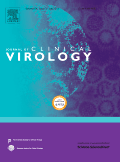
JOURNAL OF CLINICAL VIROLOGY
Pioneering Innovative Solutions in VirologyJournal of Clinical Virology, published by Elsevier, stands at the forefront of virology research, focusing on the clinical implications of viral diseases. With an impressive impact factor representative of its Q1 categorization in both Infectious Diseases and Virology, this journal is essential for researchers and healthcare professionals aiming to keep pace with evolving knowledge and treatments in virology. Since its inception in 1998, it has provided a vital platform for the dissemination of significant breakthroughs, now continuing through to 2024. The journal boasts competitive Scopus ranks, placing it in the 95th percentile for Infectious Diseases and the 91st percentile for Virology. Scholars can benefit from its selective Open Access options, promoting widespread access to cutting-edge research. With an ever-increasing demand for innovative solutions to viral infections, Journal of Clinical Virology remains dedicated to fostering advancements in the field, making it a key resource for anyone invested in virology and infectious disease management.
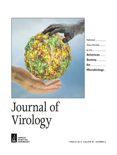
Journal of Virology
Transforming Insights into Virology and HealthJournal of Virology is a premier scholarly journal dedicated to advancing the field of virology, focusing on the molecular mechanisms of virus-host interactions, viral pathogenesis, and the latest therapeutic and vaccine developments. Published by the American Society for Microbiology, this esteemed journal has been a cornerstone for researchers since its inception in 1967, providing a platform for high-quality, peer-reviewed research. With a commendable impact factor indicative of its relevance and influence, the journal is categorized in the top quartile (Q1) for Virology, Microbiology, and Insect Science, reflecting its significance in these fields. Researchers can access a wealth of studies and findings that shape our understanding of viruses and their interactions with hosts, highlighting its role in both basic and applied sciences. Positioned in the United States, the Journal of Virology serves a global audience, ensuring that cutting-edge discoveries reach professionals, students, and academics alike. Join the conversation as we explore the complexities of virology and its implications for human health and disease.

VIROLOGICA SINICA
Unveiling Innovations in Infectious Disease ScienceVIROLOGICA SINICA, published by KEAI PUBLISHING LTD, is a leading international journal dedicated to the field of virology. With an ISSN of 1674-0769 and E-ISSN of 1995-820X, this esteemed journal showcases cutting-edge research from 2006 to 2024, focusing on critical developments in Immunology, Infectious Diseases, Molecular Medicine, and Virology. As evidenced by its respectable positioning in the Q2 quartile of relevant categories and impressive Scopus rankings—such as Rank #20/80 in Virology—VIROLOGICA SINICA serves as an essential resource for researchers, professionals, and students aiming to deepen their understanding of viral pathogens and their impact on human health. While the journal does not currently offer open access, it remains an invaluable publication for those seeking to stay at the forefront of virology research. Its address is located at 16 Donghuangchenggen North St, Beijing, China, where it continues to foster academic excellence in the rapidly evolving landscape of virology.

Advances in Virology
Advancing Knowledge, Transforming VirologyAdvances in Virology, an esteemed journal published by HINDAWI LTD, serves as a pivotal platform for cutting-edge research in the field of virology and infectious diseases. With its ISSN 1687-8639 and E-ISSN 1687-8647, the journal has been a significant contributor to the scientific community since its initiation as an Open Access resource in 2009, allowing researchers from around the globe to access groundbreaking findings without barriers. Operating out of the United States and recognized for its commitment to high-quality research, the journal's relevance is underscored by its ranking in the Q3 category for Infectious Diseases and Q4 for Virology as of 2023. The time frame of publications spans from 2009 to 2024, reflecting a continuous commitment to exploring the evolving landscape of virology. This journal not only promotes the dissemination of novel insights and methodologies but also fosters collaboration and innovation within the scientific community, making it an invaluable resource for researchers, professionals, and students alike.
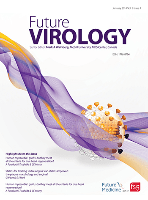
Future Virology
Fostering Collaboration for Viral BreakthroughsFuture Virology, published by Future Medicine Ltd, is an essential journal dedicated to advancing the understanding of virology in the contemporary scientific landscape. With an ISSN of 1746-0794 and an E-ISSN of 1746-0808, this journal serves as a platform for researchers and practitioners in the field to publish high-quality, peer-reviewed articles that explore novel discoveries, innovative therapeutic strategies, and the implications of viral research on global health. Operating from the United Kingdom and maintaining a commitment to rigorous scientific inquiry, Future Virology is categorized in the Q4 Quartile for Virology according to the latest Scopus rankings, with a position of Rank #48/80 and a percentile of 40th in the Virology category. Although it currently does not offer open access, the journal strives to disseminate critical insights that benefit a wide range of professionals, researchers, and students engaged in virology and related fields. By bridging the gap between basic research and practical applications, Future Virology plays a crucial role in fostering innovation and collaboration in the ever-evolving virology landscape.